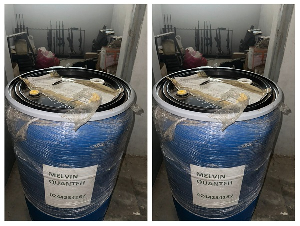 The shop owners have been cautioned to regularize their trading activities
The shop owners have been cautioned to regularize their trading activities
Sixty-six shops belonging to foreigners have been identified to be operating illegally in the Central Business District of Koforidua.
They have, therefore, been cautioned by the Technical Sub-Committee on Foreigners in Retail Trade, of the Ministry of Trade and Industry to regularize their trading activities to avert the closure of their shops.
This came to light, when the Technical Sub–Committee, undertook a two-day exercise within the business hub in Koforidua. Whereas some of the foreigners had no resident or working permit, others had not registered their businesses and therefore had no Tax Identification Numbers (TIN) and others were found to be using documents of Ghanaian traders in transacting their businesses.
Briefing the media after the exercise, Mr Maxwell Apenkro, Secretary of the Committee indicated that all the owners of the 66 shops had been given a period between 3-14 days to rectify the anomalies or risk closure of their shops.
He said the team made up of the Ghana Revenue Authority (GRA), the Ghana Immigration Service (GIS), Ghana Police Service and the Ghana Union Traders Association (GUTA) among others realised that most of the foreigners owning shops did not have appropriate documents to operate in the country.
Mr Apenkro explained that once most of the foreigners were not having TINs, it implied that they were not paying any tax and assured that the committee would ensure that they regularize their immigration and business documentation within the time frame.
He said per the laws, foreigners were not supposed to register as sole proprietors but as limited by share, and were also required to pay corporate taxes and not tax stamps to ensure they paid the right taxes to the state.
Mr Apenkro disclosed that the Committee also identified in some cases, where the shops were owned by Ghanaians but the workers were foreigners, however, once they were no documentary evidence to prove as such, the purported Ghanaian owners must ensure they had resident as well as work permits to that effect.
He said the team would follow up after the given period to ascertain whether they had complied with the directives, however, “if they fail to do so the only option would be to lock up their shops”.












